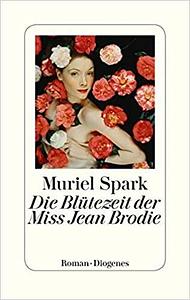Take a photo of a barcode or cover
Le cercle des poètes disparus, but make Robin Williams a fascist ??
This book had a very interesting concept, but unfortunately it failed to engage me the whole time. Well worth a read, just not as good as I had hoped.
Sara | Book Confessions of an ExBallerina
Sara | Book Confessions of an ExBallerina
Abandoned. Not keen on the vibe that this teacher is very deliberately grooming a group of her students…
A quick, cleverly-written read. I can see why this was adapted to screen and television.
I found Muriel Spark's use of the omniscient third person narrative style most interesting.
I found Muriel Spark's use of the omniscient third person narrative style most interesting.
funny
inspiring
fast-paced
Plot or Character Driven:
Character
Strong character development:
Yes
Loveable characters:
Complicated
Diverse cast of characters:
No
Flaws of characters a main focus:
Yes
Teacher Wanted: Renegade, ante-spinster willing to share her knowledge and passions intimately with small groups of young, impressionable females. Only those with keen intellect, aesthetic sensibilities, and a soft spot for Mussolini need apply.
Spark is one of the few writers who so consistently--in the three books of hers I've read--manages to tell such wistful, kind-of-delightful-or-amusing-on-the-surface tales while threading them with all manner of dark undercurrents and weighty moral issues: the role of the individual and his/her obligations to society, gender norms and expectations, what it means to be loyal, the purpose of education, destiny vs. free will, and so on.
In the "About Muriel Spark" section at the end of this edition she's quoted as having said:
------------------------------------------------------------------
WORDS I LEARNED FROM THIS BOOK:
tussore | musquash | dragoman
Spark is one of the few writers who so consistently--in the three books of hers I've read--manages to tell such wistful, kind-of-delightful-or-amusing-on-the-surface tales while threading them with all manner of dark undercurrents and weighty moral issues: the role of the individual and his/her obligations to society, gender norms and expectations, what it means to be loyal, the purpose of education, destiny vs. free will, and so on.
In the "About Muriel Spark" section at the end of this edition she's quoted as having said:
"Satire is far more important, it has a more lasting effect, than a straight portrayal of what is wrong. I think that a lot of the world's problems should be ridiculed, but ridiculed properly than, well, wailed over."We just may have lost the Properest Ridiculer of all time when she died.
------------------------------------------------------------------
WORDS I LEARNED FROM THIS BOOK:
tussore | musquash | dragoman
Such a strange little book. I found the narrative voice quite riveting interesting, in its retrospective approach, its omniscience and its odd way of dropping in flash forwards. It would be an interesting book to teach in a fiction forms class as well as just discuss in a book group. Reading it alone, I feel like I didn't get as much out of it as I would have if I was reading it alongside others.
This is one of those strange books that I don't know how to rate. I can't say the writing was bad. The story is about one of those people who are not especially extraordinary, but they manage to have undue influence on many people's lives, based upon their sheer audacity and supreme belief in themselves. Perhaps Miss Jean Brodie could be called a classic narcissist. There is the golden child and the one that gets blamed for everything. There are the manipulated in betweeners who can't see the big picture. There are the few who can see her for what she is but have trouble gathering concrete evidence. One of her victims, er protogees, eventually sees the truth, betrays Miss Brodie, and falls from a state of grace, punishing herself with a life long penance.
In one slim book, Muriel Spark created one unforgettable character and (slyly) another who causes her downfall. She also portrayed the culture of an elite girls school and hinted at the differences of culture between the Scots and the English. She showed class divisions. She quietly sketched the impact of World War I (the “Great War”) on men and on women in the UK. Most of all, she brilliantly demonstrated what happens to a smart, self-assertive, proud, and independent woman in a time when those qualities were both admired and feared.
challenging
medium-paced
Plot or Character Driven:
Character
Strong character development:
Complicated
Loveable characters:
No
Diverse cast of characters:
No
Flaws of characters a main focus:
Yes





